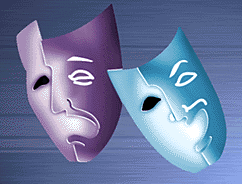<< Rant Index
![]()
<< Rant
Index
1. MASK OF COMEDY:
 |
You've seen these before. Everyone has - the masks of Comedy and Tragedy. For our purposes though, I would prefer you think of them as the masks of laughter and weeping. Let's look at them one at a time. Laughter, in addition to being a reflection of the truth, is also a reflex; a coordinated contraction of fifteen facial muscles in a stereotyped pattern, accompanied by altered breathing. In its spontaneous form, it occurs without the intervention of higher mental processes. Your friend falls on the ice and you laugh. Why do you do that? Because it's unexpected. He's not supposed to fall. He's supposed to walk. But it's not JUST unexpected. It's also logical too. After all, ice is slippery. You've fallen before. You know what it's like. But this time it wasn't you that fell. It was someone else. And so without a thought, you explode in a good hearty laugh. Going back to some comments I made about action and status, the more pompous the character who falls, the harder we'll likely laugh. |
Such actions begin in the sympathetic-adrenal system and it must be that they are there to help buffer us in our struggle for survival. What is this reflex that causes us to laugh without conscious control? I think the humorist Mel Brooks was speaking to this point quite nicely when he said that; "Comedy is when you break your leg. Tragedy is when I stub my toe." If we value the truth, then we must admit that much, if not most, of life is expressed in the drive to ASSERT OURSELVES. Comedy comes into existence at the first sign of your failure or someone else's to do that, as a release of tension, when the drive to succeed takes you off course, into a ditch, into a river, into the jaws of a crocodile. Comedy would be quite beside the point were it not so necessary as a release valve. You see, everyone is so serious about their drives, so proud of their accomplishments, their intelligence, their hard-earned record of success. No one wants to fail, and yet we all do, CONSTANTLY. We all know what that's like because life is not a perfect dream, but rather an imperfect experience lived in this very impermanent physical body. |
|
|
| | TeleCircus | SpoonLife | pARTy/SCIENCE | Anon Salon | Audience Experience | |
| | Feedback | Contact: Mark "Spoonman" Petrakis | SiteMap | |